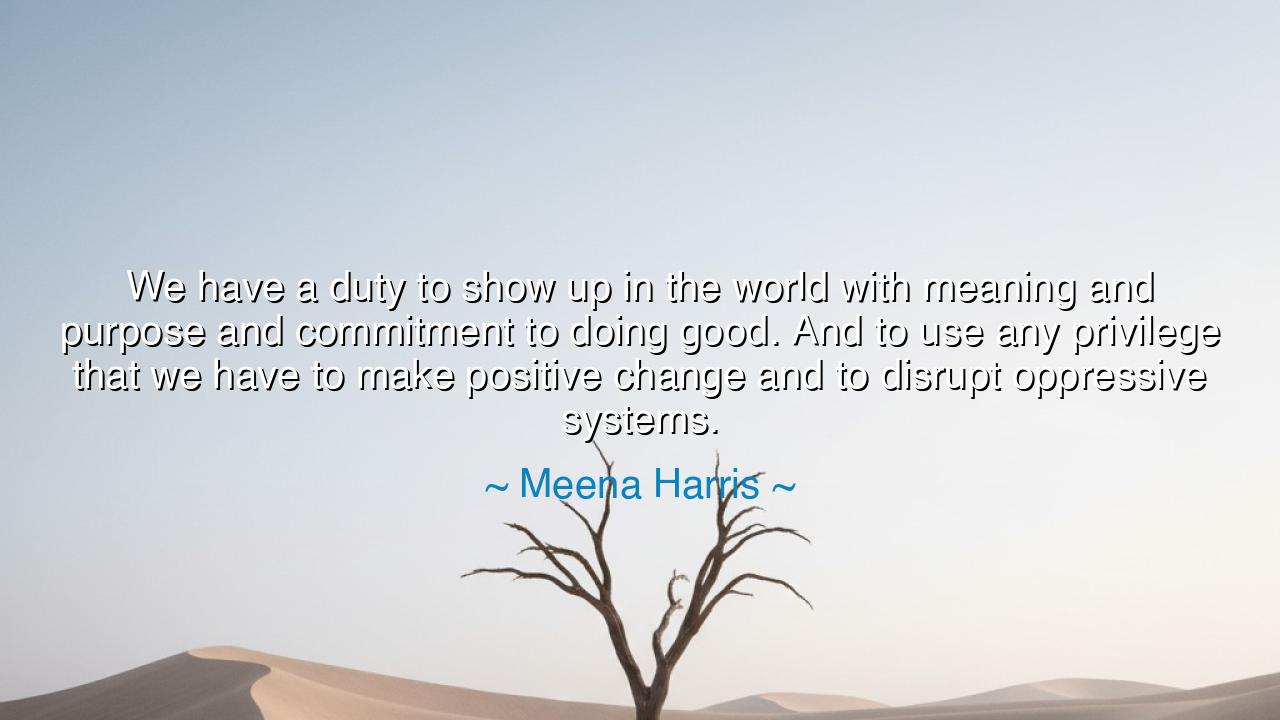
We have a duty to show up in the world with meaning and purpose
We have a duty to show up in the world with meaning and purpose and commitment to doing good. And to use any privilege that we have to make positive change and to disrupt oppressive systems.






Host: The room was quiet, the gentle light from the lamp casting soft shadows on the walls. Jack sat near the window, his fingers lightly tapping the edge of his coffee mug as he stared out into the evening. Jeeny, across from him, was curled up in her chair with a book, though her focus seemed to be elsewhere. The calmness of the moment felt like the perfect opportunity to reflect on something deeper, something important.
Host: Meena Harris’ words filled the space: “We have a duty to show up in the world with meaning and purpose and commitment to doing good. And to use any privilege that we have to make positive change and to disrupt oppressive systems.” The simplicity and urgency of the statement seemed to open up a conversation about responsibility, privilege, and the power we each have to contribute to change. Jack, always practical about the role of individuals in making a difference, was the first to speak.
Jack: His voice was thoughtful, almost with a sense of conviction: “I really resonate with that. It’s easy to feel like we don’t have the power to change anything, but Harris is saying we all have a duty—whether through the privilege we hold or the positions we occupy—to make a difference. We’re not just here to live our own lives; we’re here to act with purpose, to disrupt the systems that hold people back, and to work toward positive change.”
Jeeny: She nodded slowly, her voice gentle, but filled with insight: “Exactly. The key isn’t just having privilege—it’s using it for something greater. We all have some kind of power, whether it’s through our influence, our platform, or our ability to help others. But it’s up to us to decide what we’re going to do with that power. Harris is challenging us not to sit idly by, but to show up with purpose, to use what we have to create positive change and to address the systems that perpetuate inequality.”
Host: The room seemed to grow a little heavier, as the conversation began to explore the deeper implications of Harris’ message. The understanding that privilege—something that can be so often taken for granted—also comes with the responsibility to act, to engage in creating change, felt like a significant realization. Jack, who often focused on practical actions, seemed to reflect more on the moral side of privilege and responsibility.
Jack: His voice softened, almost reflective, as he continued: “Maybe that’s the challenge we face today—not just recognizing our privilege, but using it to make a real difference. It’s not enough to just live a comfortable life; it’s about being aware of the systems that oppress others and finding ways to actively disrupt them. We all have a role to play in breaking down these systems, whether through our work, our voice, or how we treat others.”
Jeeny: Her smile was gentle, but her voice firm with belief: “Exactly. We’re all part of this bigger system, and if we don’t acknowledge the role we play in either maintaining or challenging it, then we’re missing an opportunity to make the world better. Privilege isn’t something to be ashamed of, but it’s something that comes with a responsibility—to uplift others, to speak out, and to make sure we’re creating a world that’s just and equitable for everyone.”
Host: The room seemed to grow a little still as the weight of their words settled in. The realization that privilege is not just an opportunity, but a duty—a duty to create change, to disrupt oppression, and to show up in the world with purpose and commitment—felt both empowering and sobering. Jack and Jeeny sat together, understanding that true responsibility isn’t just about individual success or comfort, but about using what we have to build a better, fairer world.
Jack: His voice, now gentler, seemed to reflect a deeper understanding: “Maybe that’s the most important part of using our privilege—to not just accept it, but to actively make it count. To show up with purpose, to disrupt the systems of oppression that have kept others down, and to use whatever means we have to make a lasting impact.”
Jeeny: She nodded, her voice filled with affirmation: “Exactly. It’s about making the decision to take action, to engage, and to use whatever privileges we have to bring about change. We all have a part to play, and that’s the responsibility we carry—how we show up in the world and how we use our power to create a more just society.”
Host: The evening continued, but the world outside felt distant. Inside, Jack and Jeeny sat in the realization that privilege comes with responsibility—to act with purpose, to disrupt systems of inequality, and to use what we have to bring about change. Harris’ words were a call to action, reminding them that no matter our position in life, we all have the ability to make a difference. The question was not whether we have the power, but whether we choose to use it.






AAdministratorAdministrator
Welcome, honored guests. Please leave a comment, we will respond soon